Metis have same rights as status Indians under Canadian Constitution upheld by court ruling
Non-status severed from ruling giving Metis same rights as status Indians
NATIONAL NEWS | 17. APR, 2014
APTN National News
OTTAWA-The Federal Court of Appeal has upheld a Federal Court decision that found the Metis have the same rights as Status Indians under the Canadian Constitution.
The appeal court, however, did not include non-status Indians in the decision, arguing it was a separate issue that needed to be dealt with on a case by case basis.
The appeal court's decision in the Daniels case, if it stands, means Ottawa now has a fiduciary responsibility to the Metis who can now access programs and services previously exclusively offered to status First Nations people and Inuit. At the core, the case hinged on whether Ottawa or the provinces had jurisdiction over the Metis and non-status Indians.
"The Court declares that the Metis are included as 'Indians' within the meaning of section 91(24) of the Constitution Act, 1867," said the decision written by Justice Eleanor Dawson and concurred with by Justice Marc Noel and Justice Johanne Trudel.
Clement Chartier, president of the Metis National Council, said he was "very pleased" with the ruling.
"It is a significant victory and it is going to make it easier for us as we continue dealing with the federal government and continue our relationship building with the federal government," said Chartier.
There are about 350,000 Metis in Canada.
Ottawa can still try to challenge the decision with the Supreme Court of Canada.
"We are reviewing all elements of (Thursday's) decision to determine next steps," said Aboriginal Affairs Minister Bernard Valcourt's office in a statement.
Valcourt's office said it was "pleased" non-status Indian issue severed from the ruling on the Metis.
The Congress of Aboriginal Peoples, which represents Metis, non-status and off-reserve status people, said it was studying whether to appeal ruling to seek clarity on the non-status component.
"It's a new ear of collaboration," said CAP National Chief Betty Ann Lavallee.
Labrador's NunatuKavut Community Council said it was "thrilled" with the decision.
"This is a major step towards the recognition and equality that we deserve," said NCC President Todd Russell. "The Daniels decision should help change that, Government needs to bite the bullet and move forward to negotiations with us, rather than continue to ignore our rights and their obligations."
The NCC, formerly the Labrador Metis Nation, has been trying to negotiate a land claim with Ottawa for 23 years.
The Daniels case was started in 1999 by Harry Daniels, a Metis leader who was president of the Congress of Aboriginal Peoples, and Leah Gardner, a non-status Indian woman from northwestern Ontario. After Daniels died in 2004, his son Gabriel Daniels was added to the case along with Terry Joudrey, a non-status Mi'kmaq from Nova Scotia.
Ottawa has long held the position that it was only responsible for status Indians registered under the Indian Act and the Inuit. The Inuit had to to also fight for that recognition in court and won it in 1939.
The appeal court, however, excluded non-status Indians from its ruling.
"The reasons for excluding people from Indian status are complex, far-ranging and often unrelated to one another," the appeal court said. "To determine the limits of the word 'Indian' as it pertains to non-status Indians under the division of powers it is necessary to analyze the reason each class of individual was excluded from the Indian Act on a case-by-case basis."
+++++++
Court of Appeal upholds landmark ruling on rights of Métis
Off-reserve aboriginal people say decision is yet another victory in what has been a long legal saga
The Canadian Press Posted: Apr 17, 2014

Congress of Aboriginal Peoples National Chief Betty Ann Lavallée responds to a question during a news conference about the impact of a federal court decision on Métis and Non-Status Indians on January 8, 2013 in Ottawa. (Canadian Press)
Métis win appeal court ruling giving them Indian status 12:58
Ruling on rights of Métis upheld 9:41
Related Stories
The Federal Court of Appeal has largely upheld a landmark ruling that could extend Ottawa's responsibilities to hundreds of thousands of aboriginal people who are not affiliated with specific reserves and have essentially no access to First Nations programs, services and rights.
Off-reserve aboriginals say the appeals court decision is yet another victory in what has been a long legal saga with the federal government.
"Métis and non-status Indians have never been granted the same recognition and rights as those provided (to) status Indians living on reserve," said Betty Ann Lavallee, national chief of the Congress of Aboriginal Peoples.
"They have been shut out for far too long on being recognized for who they are and where they fit within the Canadian society."
Legal battle began in 1999
The Congress of Aboriginal Peoples and several Métis and non-status Indians took the federal government to court in 1999, alleging discrimination because they were not considered "Indians" under a section of the Constitution Act.

A Federal Court upheld a ruling declaring Métis should be considered 'Indians' under the Constitution. (CBC)
They argued they have been denied certain benefits, which included:
- access to the same health-care, education and other benefits made available to status Indians;
- being allowed to hunt, trap, fish and gather on public lands; and,
- the ability to negotiate and enter into treaties with the federal government.
The Métis and non-status Indians scored a major victory last year when the Federal Court recognized them as "Indians" under the Constitution.
The federal government appealed that ruling.
On Thursday, the appeals court upheld part of the decision. It ruled that while Métis should remain Indians under the Constitution, extending that recognition to non-status Indians should be done on a case-by-case basis since it is a separate issue.
"It follows that non-status Indians as a group do not lend themselves to the declaration of general application sought by the respondents," wrote Justice Eleanor Dawson.
"However the matter is considered, no purpose is served by addressing the question on the generic basis proposed: the declaration lacks utility and will not settle any issue between non-status Indians and the federal government."
Still, Métis groups celebrated the decision.

Clement Chartier, president of the Métis National Council, is seen at a ceremony to honour Métis veterans in November 2009. (David Vincent/The Associated Press)
"We as Métis are a practical people who seek practical solutions to make the Canadian federation work for us. As residents and taxpayers of the provinces, we always accepted that the provinces have an important role to play with us," MétisNational Council president ClementChartier said in a statement.
"At the same time, we always believed that Ottawa has primary responsibility to deal with us and must show leadership. The decision today buttresses this belief. The federal government can no longer shrug its shoulders and assume that Métis matters will be dealt with by others, all the while knowing this is not being done."
Appeal to Supreme Court likely
If the federal government appeals again, the case would go the Supreme Court.
Should that ever happen, and if the Supreme Court sides with the Métis people, it could still take years before the ruling translates into any actual benefits for them. The government would have to reshape its policies and enter into negotiations with the Métis.
Aboriginal Affairs Minister Bernard Valcourt's office would not say whether the government plans to appeal.
Aboriginal Affairs Minister Bernard Valcourt has not ruled out an appeal to the Supreme Court of Canada.
"We are pleased that the court granted part of our appeal, and we are reviewing all elements of today's decision to determine next steps," spokeswoman Erica Meekes said in an email.
She also defended the government's decision to appeal the original Federal Court decision.
"Our priority is to create jobs, economic growth and long-term prosperity for all Canadians, including Métis," Meekes said.
"Given that the previous Federal Court decision raised complex legal issues it was prudent for Canada to obtain a decision from a higher court."
The federal Liberals called on the Conservatives to start talks with the Métis people.
"This important clarification of the responsibilities of the federal government to Métis peoples in Canada has been a long time coming," Carolyn Bennett, the party's aboriginal affairs critic, said in a statement.
"Liberals believe fundamental issues like this should be resolved around a negotiating table and not in a court room.
"It is time for the government to initiate good faith negotiations with these communities about how they will work collaboratively to implement the rights affirmed by the court today."
DOCUMENTPAGESZoom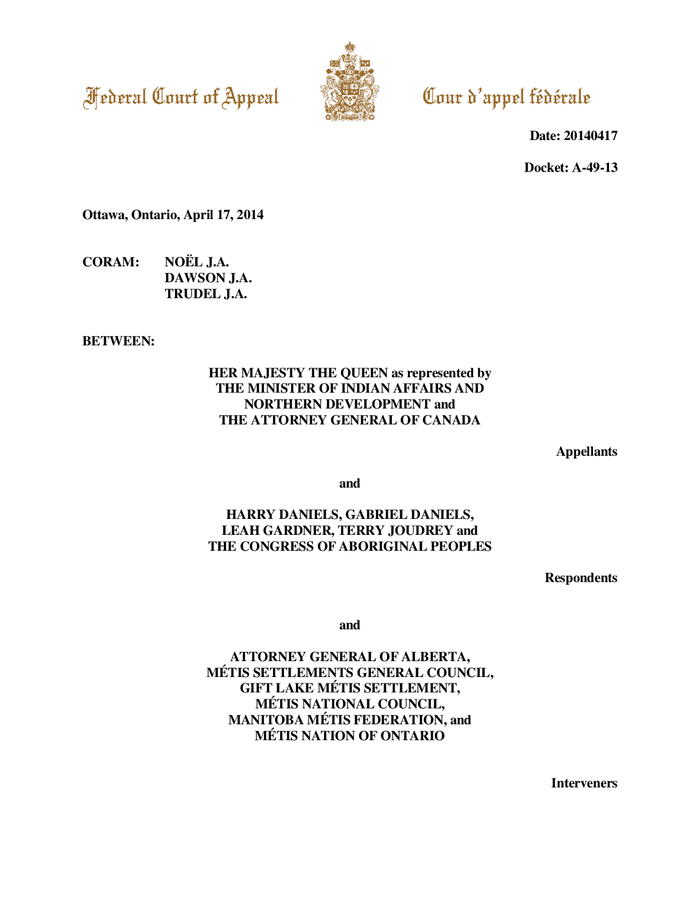
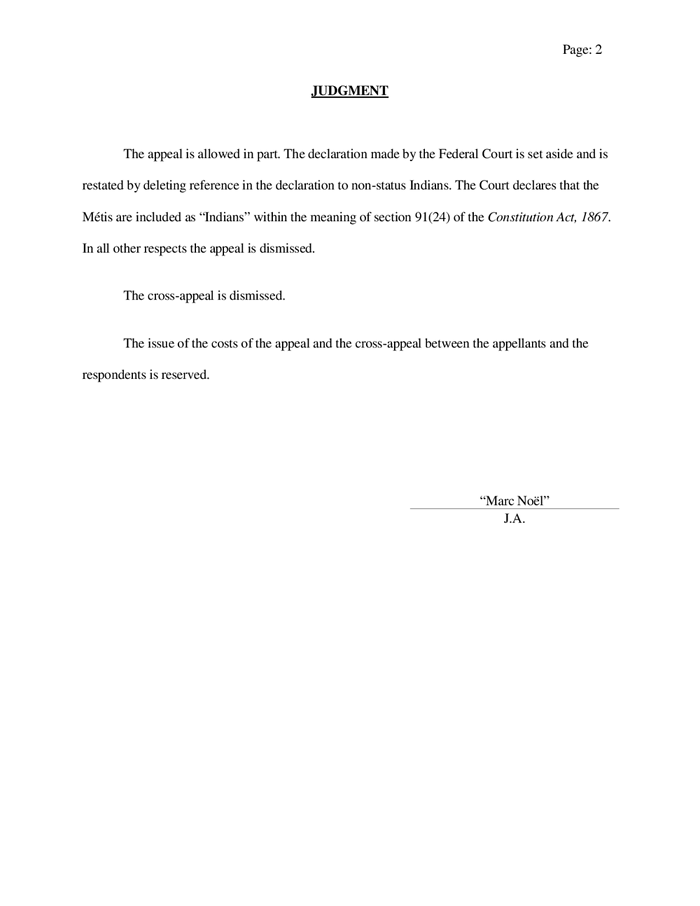 «Page 1 of 2»DOCUMENTPAGESZoom
«Page 1 of 2»DOCUMENTPAGESZoom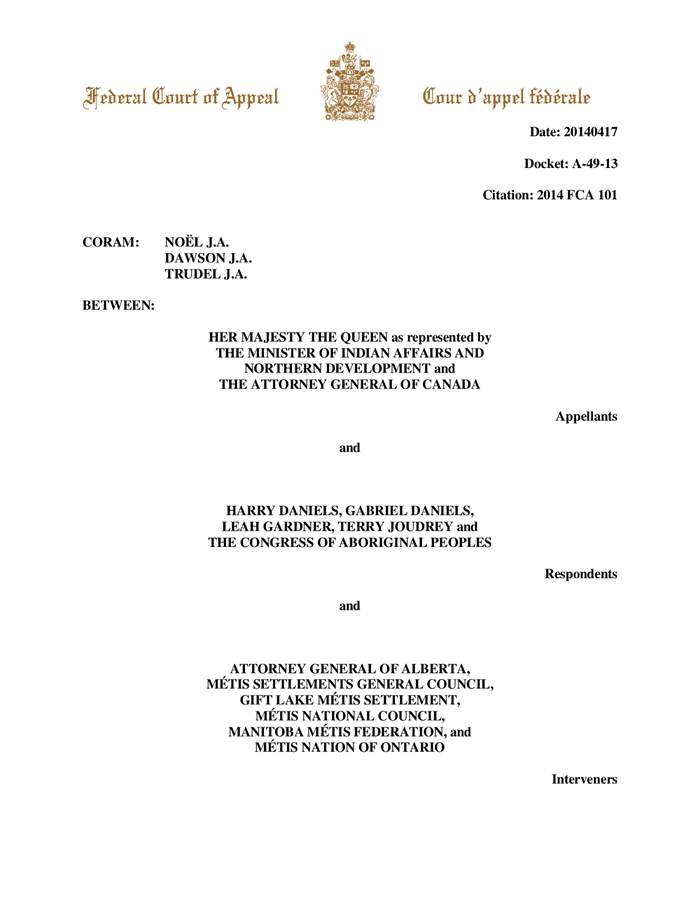
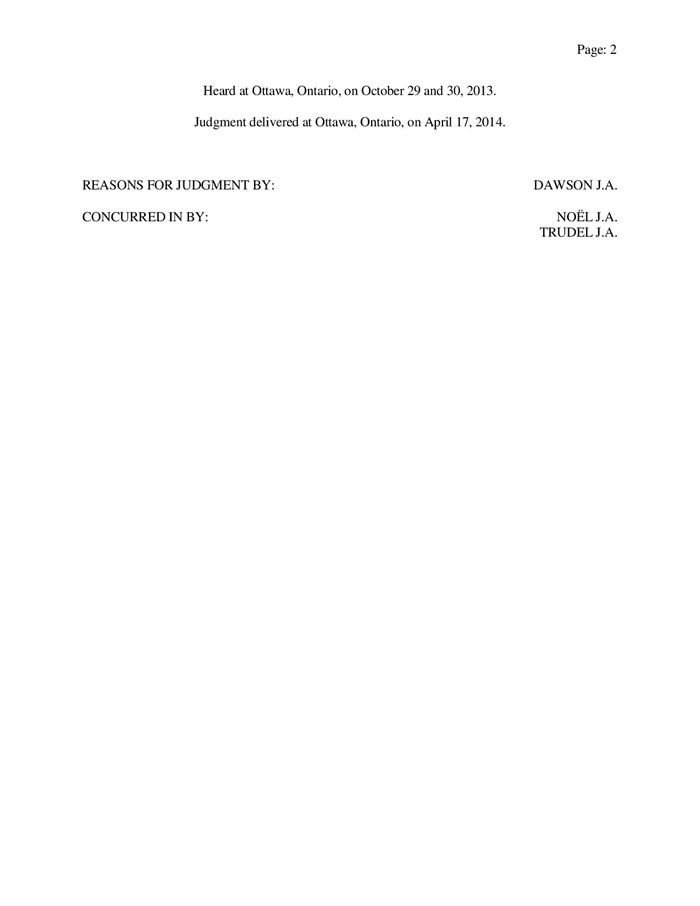
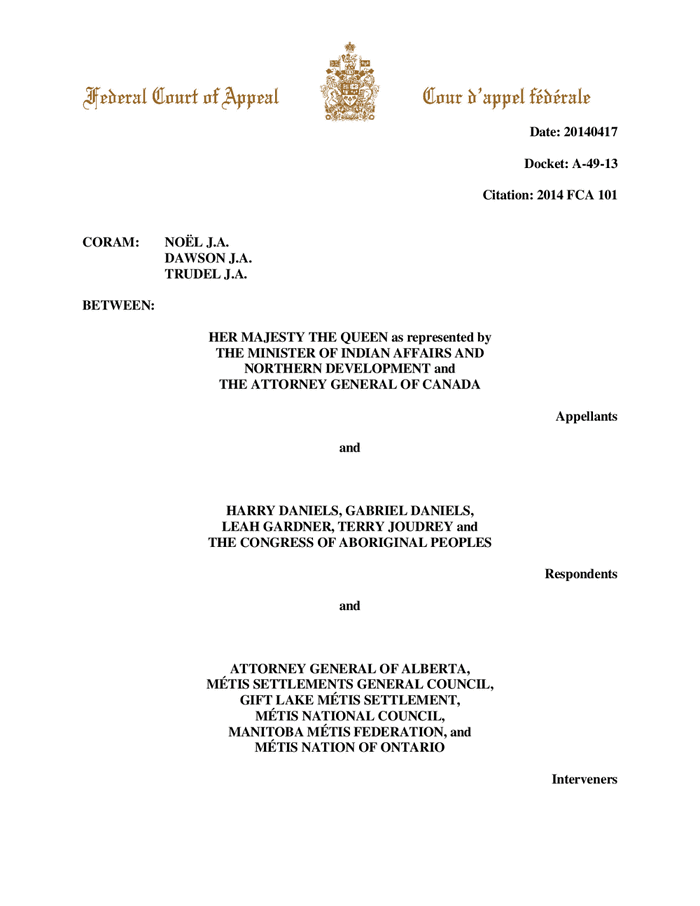 «Page 1 of 57»
«Page 1 of 57»
Corrections
- The headline on an earlier version of this story incorrectly stated the Appeal Court ruling granted "Indian status" to Métis. In fact, the ruling declared that Métis are Indian under the Constitution. Status under the Indian Act is a matter of negotiation for the federal government.



